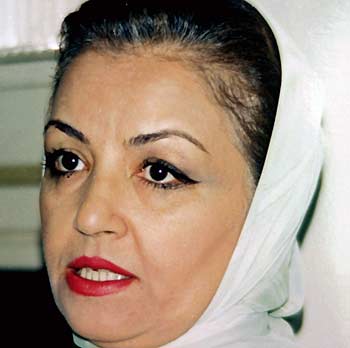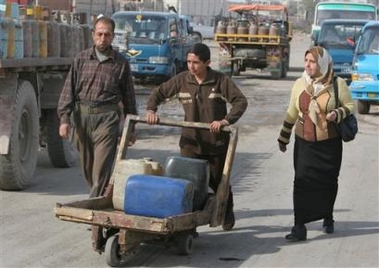|
Shiites lead Iraq's parliamentary election
(AP)
Updated: 2005-12-20 09:22
Preliminary election returns Monday showed Iraqi voters divided along ethnic
and religious lines with a commanding lead held by the religious Shiite
coalition that dominates the current government.
Meanwhile, an Iraqi lawyer said at least 24 top former officials in Saddam
Hussein's regime were freed from jail without charges. They included biological
and chemical weapons experts known as "Dr. Germ" and "Mrs. Anthrax."
Violent demonstrations also broke out across Iraq and the oil minister
threatened to resign after the government raised the prices of gasoline and
cooking fuel by up to nine times. And a militant group released a video of the
purported killing of an American hostage.
Early vote tallies suggested disappointing results for a secular party led by
former Prime Minister Ayad Allawi, a U.S. favorite who hoped to bridge the often
violent divide that has emerged between followers of rival branches of Islam
since the fall of Saddam.

Doctor Huda Ammash, known as "Mrs Anthrax"
speaks to the press in this 2002 file picture taken in Baghdad. Saddam
Hussein's weapons experts known as "Dr Germ" and "Mrs Anthrax" are being
released, an Iraqi lawyer said on December 19, 2005. Baghdad lawyer Badia
Aref said 26 people, including five who were ill, were now in the process
of being released, including Huda Ammash, nicknamed "Mrs Anthrax" by the
popular press, and Rihab Taha, dubbed "Dr
Germ".[Reuters/file] |
As expected, religious groups, both Shiite and Sunni, were leading in many
areas �� an indication that Iraqis may have grown more religious or conservative.
Still, the ruling Shiite coalition �� known
as the United Iraqi Alliance and endorsed by Iraq's most prominent cleric, Grand
Ayatollah Ali al-Sistani �� was unlikely to win the two-thirds majority, or at
least 184 seats, needed to avoid a coalition with other parties.
A senior official in the Supreme Council for the Islamic Revolution in Iraq,
one of the main groups in the United Iraqi Alliance, said the alliance was
expecting to get about 130 seats.
"The United Iraqi Alliance strongly believes that all the various components
of the Iraqi people should participate in the decision making, including forming
the upcoming government. This means that the new Iraqi government will be a
national unity government," Redha Jawad Taqi said.
The alliance is headed by cleric Abdul-Aziz al-Hakim, one of the most
powerful figures in the country.
"It's going to be 'Let's Make a Deal," said Anthony Cordesman, an Iraq
analyst with the Center for Strategic and International Studies in Washington.
"The important thing in some ways was that there was a large vote. The concerns
that it would fall along ethnic and sectarian lines were validated."

Iraqis arrive at a gas station to fill
containers with kerosene in Baghdad, Iraq, Monday, Dec. 19, 2005.
[AP] | U.S. officials hope a coalition government involving Sunni Arabs will weaken
a Sunni-led insurgency. Sunnis, a minority group favored under Saddam, voted
heavily on Thursday after boycotting earlier elections.
Preliminary results of Thursday's elections for the 275-member parliament
from 11 provinces showed the United Iraqi Alliance winning strong majorities in
Baghdad and largely Shiite provinces in the south.
Kurdish parties were overwhelmingly ahead in their three northern provinces,
while results from one of the four predominantly Sunni Arab provinces,
Salahuddin, showed the Sunni Arab minority winning an overwhelming majority.
In Baghdad province �� the country's biggest electoral district �� elections
officials said the United Iraqi Alliance took about 59 percent of the votes from
89 percent of ballot boxes counted.
The Sunni Arab Iraqi Accordance Front �� which includes some religious groups
�� received about 19 percent, and the Iraqi National List headed by Allawi, a
secular-minded Shiite, trailed with nearly 14 percent.
Results from southern Basra province, also mixed but predominantly Shiite,
saw the United Iraqi Alliance significantly ahead, winning 612,206 votes with 98
percent of ballot boxes counted. Allawi's list was far behind in second with
87,134 votes, while the Sunni Iraqi Accordance Front trailed with 36,997 votes.
|